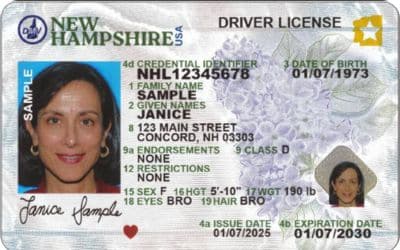Overview of New Hampshire ID scanning laws
New Hampshire has 3 laws which we consider relevant to ID verification, in addition to other laws which may related to age verification, identity verification, KYC, privacy, and biometrics.
Can you scan IDs in New Hampshire?
No. New Hampshire is the only US state that explicitly prohibits most instances of ID scanning.
SB311 was proposed to reverse this, but died in chamber.
ID scanning in New Hampshire is allowed for financial institutions, insurance companies, motor vehicle-related businesses, or if consent is obtained before scanning. This data may only be used to verify identity or prevent fraud, and cannot be sold, rented, or transferred.
ID scanning is only allowed for other businesses in New Hampshire if the scanner does not visibly identify personal information other than driver’s license number and name, and does not retain, store, or transfer personal information other than driver’s license number and name.
Can you save data from a scanned ID in New Hampshire?
New Hampshire law prohibits anyone from knowingly scanning, recording, retaining, or storing in electronic format personal information obtained from a driver’s license, unless authorized by the New Hampshire DMV. New Hampshire does allow storage of information from the front of a driver’s license in non-electronic format, as long as the license holder’s consent is obtained, meaning this data can be manually typed or written.
Does New Hampshire offer affirmative defense for ID scanning?
No. New Hampshire currently has no affirmative defense laws related to ID scanning, however, there is proposed legislation that speaks to affirmative defense in some scenarios.
What types of IDs does New Hampshire issue?
New Hampshire issues drivers licenses and state IDs, including REAL ID.
Individual New Hampshire ID verification laws

Prohibition on ID scanning
New Hampshire does not allow for scanning or swiping of an ID in most instances.

Age verification for alcohol sales
New Hampshire businesses are allowed to scan IDs to verify age for alcohol sales, provided the scanner does not store information.

Age verification for tobacco sales
New Hampshire businesses are allowed to scan IDs to verify age for tobacco or vape sales, provided the scanner does not store information.

Verifying identity for catalytic converters
Businesses must verify ID and legal proof of ownership before purchasing or accepting a catalytic converter. Photocopies or digital images of the documentation must be recorded.
Data privacy laws in New Hampshire
The New Hampshire Privacy Act (SB 255) took effect on January 1, 2025. This act gives consumers the right to:
- Confirm whether a company is processing or accessing their data
- Correct inaccuracies in their data
- Delete their data
- Obtain a copy of their data
- Opt out of their data being sold or used for advertising
Businesses must comply if they either process the personal data of at least 35,000 unique New Hampshire consumers or process data of 10,000 New Hampshire consumers and derive more than 25% revenue from the sale of personal data. Nonprofit organizations, higher education institutions, HIPAA-covered entities, and financial institutions are exempt. Included businesses must:
- Limit the collection of personal data to what is “adequate, relevant, and reasonably necessary” unless consent is given.
- Maintain security practices to protect personal data.
- Disclose to customers if their data is being sold, and provide an opt-out if so.
- Not process sensitive data without consumer consent.
- Provide the ability for consumers to revoke consent.
- Conduct a data protection impact assessment on the processing of data from or after July 1, 2024.


